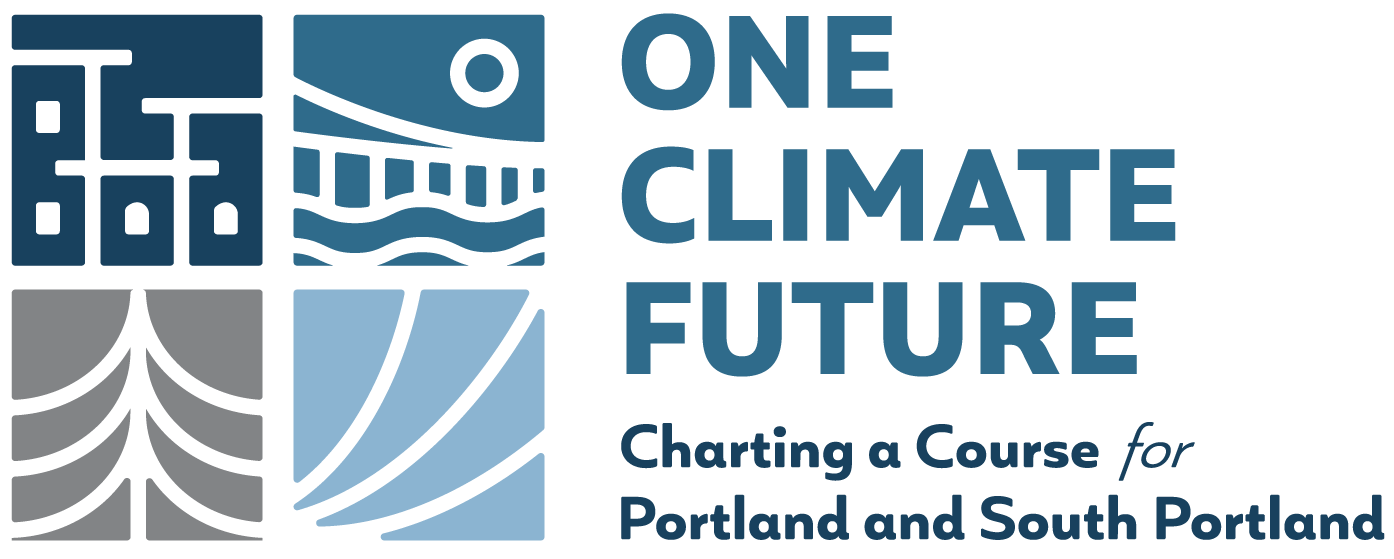Portland Progress

CLIMATE RESILIENCE
16 IN PROGRESS
1 NOT STARTED
(updated December 2023)

Integrate resilience standards and targets into Portland and South Portland’s land use code to minimize flood risk and promote resilient buildings and neighborhoods citywide.
Status: In Progress
Update: Completed dynamic coastal flood inundation modeling for Portland in collaboration with U.S. Army Corps of Engineers, FEMA, NOAA, USDA, USGS, and Maine ACFD (2021). Developed and released draft approach to climate resilience zoning (2023). Drafting of Coastal Flood Resilience Overlay Zone and city-wide standards to promote climate resilience underway with planned release in 2024.
Transformative potential: Regenerative, resilient
Key Milestones: No new incompatible, vulnerable, or hazardous uses built in areas of highest flood risk by 2026 (with adoption of resilience overlays)
Build knowledge, tools, and resources on climate risks and adaptation options for buildings and property.
Status: In Progress
Update: Building knowledge on impacts of high heat and stormwater flooding. (updated December 2023)
Transformative potential: Resilient
Key Milestones: All city residents have access to tools to assess future flood risk to property by 2026; Maine real estate flood risk disclosure required by 2026
Establish open space climate resilience goals and protocols for monitoring progress towards those goals in Portland and South Portland’s open space planning.
Status: In Progress
Update: Pursuing funding for a Tree Canopy Master Plan. (updated December 2023)
Transformative potential: Regenerative, resilient
Key Milestones: Benchmark ecosystem and resilience metrics for open spaces and establish performance goals by 2028
Continue to expand access to resilient and energy efficient affordable housing, contributing to diverse and inclusive communities.
Status: In Progress
Update: State adopted LD1656 “An Act to Promote Energy Efficient Affordable Housing” requiring construction projects funded by the Maine Housing Authority to meet certain energy performance standards, including full electrification of the systems used for heating, cooling, domestic hot water, and cooking. Recent projects that have received financial assistance from the City of Portland and therefore are required to comply with the City’s Green Building Ordinance include affordable rental housing developments at 200 Valley Street (60 units), Portland Housing Authority’s Washington Gardens project at 577 Washington Avenue (100 units), 73 Winter Street (43 units), 91 Winter Street (52 units), 45 Dougherty (63 units), 25 Casco (54 units), 622 Auburn Street (72 units). In addition, two condominium projects at 104 Grant Street (23 units) and Dougherty Commons on Douglas Street (20 units). The Portland Housing Authority Washington Gardens project was a combination of new construction and rehabilitation, which enhanced the efficiency of existing affordable housing along with creating new, efficient units. Continuing efforts to make energy efficiency upgrades and renewable energy options more affordable for all residents. (updated December 2023)
Transformative potential: Equitable, regenerative, resilient
Key Milestone: Increase housing units affordable to lower and middle income households by 10% by 2025 (from 2019 baseline)*
*Portland-specific milestone
Expand the “cooling capacity” of Portland and South Portland.
Status: In Progress
Update: Allocated $250k to expand tree canopy in Bayside neighborhood (2021). Planning for tree planting in progress. Portland Forestry Team and community partners planted 41 new trees along the Bayside Trail (2023). Anticipated 125-150 additional trees to be planted in Spring 2024, along with the Forestry Team’s annual spring tree planting surge.
Transformative potential: Equitable, regenerative, resilient
Key Milestone: All residents live within a half mile of a cooling center by 2035; all residents live within a half mile of a park or open space by 2035
Cultivate healthy, regenerative, and just food systems.
Status: In Progress
Update: Completed an urban agriculture plan (2021).
Transformative potential: Equitable, regenerative, resilient
Key Milestone: Establish small grants for food system innovators by 2025; secure funding to commission foodshed assessment by 2028; expand access to community agriculture to all neighborhoods to meet demand
Continue to prioritize decision-making processes and transit investments that advance equity in our cities.
Status: In Progress
Update: Mid-term Strategy; Implemented Electrify Bikes! to offer an e-bike incentive program for low and moderate-income Portland residents (2023).
Transformative potential: Equitable, regenerative, resilient
Key Milestone: Address first round of proposals made by Community Transportation Leaders by 2026
Support and strengthen our existing community resources.
Status: In Progress
Update: Launched Sustainable Neighborhood Program to strengthen community resilience and encourage neighborhood-scale action (2023).
Transformative potential: Equitable, regenerative, resilient
Key Milestone: Award the first round of community organizations or neighborhood groups with resilience grants by 2025
Create an ongoing platform for collaborative planning to ensure that Portland and South Portland’s port and waterfronts can respond, adapt, and thrive with new climate stresses.
Status: In Progress
Update: Continue to collaborate with the Waterfront Alliance as a platform for information sharing and dialogue on waterfront matters, including climate-related projects and issues. Harbor-wide dredge planning for vessel support areas advances with anticipated start date of November 2024 for construction of a Confined Aquatic Disposal (CAD) cell serving the contaminated sediment disposal needs of both communities. (updated December 2023)
Transformative potential: Equitable, regenerative, resilient
Key Milestone: Grant funding and partnerships secured for resilient working waterfronts project by 2026
Attract, mentor, and build the skills of our cities’ workers to partake in quality jobs that help build a diverse, resilient, and regenerative economy.
Status: In Progress
Update: SMCC launched EV repair certification program (2021). Continue to promote skills courses and workforce training programs offered by Portland Adult Education, Evergreen Home Performance, Lift All Boats, Passivehaus, and more groups. (updated December 2023)
Transformative potential: Equitable, regenerative, resilient
Key Milestone: Targets set through the collaboration for net increases in individuals trained in specific sustainability and resilience fields
Build the capacity of the businesses and industries in our cities to bounce back, adapt, and innovate.
Status: In Progress
Update: Economic Development supported small businesses through a COVID hardship grant; COVID-related street closures made permanent to facilitate outdoor dining (2021). City of Portland with quasi-municipal partners are working to secure the future of the Portland Fish Exchange through State-funded infrastructure investments, program supports, and structural governance amendments to ensure a future for local fisheries and aquaculture businesses. Work has begun on a public/private partnership to construct a regional cold storage warehouse on Maine Port Authority property on the Portland Waterfront. The warehouse will improve local food manufacturing efficiency and will include the state’s largest roof-mounted solar array when completed in 2024. (updated December 2023)
Transformative potential: Regenerative, resilient
Key Milestone: Revise land use policies to reduce barriers to traditional and merging marine related industries by 2026
Use modeling and flood data to upgrade the Cities’ stormwater and sewer systems to handle future climate scenarios.
Status: In Progress
Update: Improvement of mapping/data for sewer and stormwater systems is currently ongoing; improvements to current hydrodynamic/operational flood modeling and coastal flood models continue as new data sources become available; continued improvements to SLR and Storm Surge Inundation mapping on an ongoing basis to understand parcel level and City-wide building/infrastructure impacts (2023). Development of the Coastal Resilience Overlay is underway due to the completion of the hydrodynamic model. The Coastal Resilience Overlay will continue to integrate future climate scenarios, sea level rise, and storm surge inundation mapping, as well as stormwater and sewer system upgrades. (updated December 2023)
Transformative potential: Resilient
Key Milestone: Full geospatial data set completed for sewer and stormwater system by 2024; hydrologic/hydraulic drainage model completed by 2028
Expand the use of green infrastructure systems to capture and infiltrate the first inch of stormwater in any storm.
Status: In Progress
Update: Long-term Strategy; Portland has installed and currently maintains 171 publicly-owned green stormwater infrastructure systems; these systems include soil filters, tree well filters, bioretention cells, gravel wetlands, and porous pavement areas that help manage stormwater runoff in portions of the City served by either the combined sewer or storm drain systems. In 2023, 31 bio-retention cells (Rain Gardens) were brought online in the Sagamore Village neighborhood to provide stormwater runoff treatment for approximately 17 acres with the Capisic Brook Watershed. The Water Resources Division also installed four sub-surface stormwater infiltration basins on Washington Avenue in coordination with a DPW streetscape project (2023). Development of a green infrastructure design manual to begin in 2024.
Transformative potential: Regenerative, resilient
Key Milestone: 5% of the cities’ impervious surfaces converted to green infrastructure by 2035; 10% by 2040; and 15% by 2050
Build Portland and South Portland’s energy resilience.
Status: Not Started
Update: Mid-term Strategy
Transformative potential: Equitable, regenerative, resilient
Key Milestone: Development of Resilient Power Plan by 2026; all new development over 500,000 square feet to evaluate district energy/microgrids starting within one year of microgrid enabling legislation
Adopt a risk-based transportation asset management approach.
Status: In Progress
Update: Mid-term Strategy; Forming a working group to create a more explicit protocol related to transportation assets and climate resiliency (2023); currently taking advantage of certain projects to aid in resiliency such as:
- Washington Avenue Streetscape: Construction of infiltration devices in expanded sidewalk areas to take advantage of subsurface sandy conditions and reduce stormwater flow to water-resource assets.
- USM Roundabout: Intersection design to reduce vehicle idling and delays to lessen carbon emissions from ICE-based vehicles. Integration of rain gardens to allow for on-site retention and reduce peak stormwater flow to water-resource assets.
- Libbytown Two-Way Conversion (Active MaineDOT Connecting Communities and Neighborhoods Application): Convert Congress Street to two-way to allow for intown transportation access during storm events that flood Park Avenue.
- Franklin Plan Update: Exploring the potential to adjust the elevation of Franklin from Somerset Street to Marginal Way to reduce impact from major storm events and flooding of Bayside.
Transformative potential: Resilient
Key Milestone: Climate hazards and resilience indicators applied to all asset management decision-making by 2028
Strengthen ecosystem resilience through enhancing connectivity, biodiversity, and healthy habitat.
Status: In Progress
Update: Adopted amendments to the Pesticide Ordinance to include restrictions on synthetic fertilizers to take into effect spring 2023 under the Landcare Ordinance (2022). Continue to monitor invasive pests and enforce Landcare Ordinance. (updated December 2023)
Transformative potential: Resilient
Key Milestone: Fertilizer ordinance adopted by 2022; No net coastal wetland loss by 2035; establish biodiversity and connectivity targets by 2028
Build back the health of our soils for ecological vitality, water infiltration, and carbon sequestration.
Status: In Progress
Update: Adopted soil standards for new development (2021). Portland Parks, Recreation, and Facilities Department converted all fall leaf operations to entirely mulching in place (2022).
Transformative potential: Regenerative, resilient
Key Milestone: Post-construction soil health standards adopted for new construction or major renovations by 2025; “100 Resilient Yards” achieved in each city by 2028


